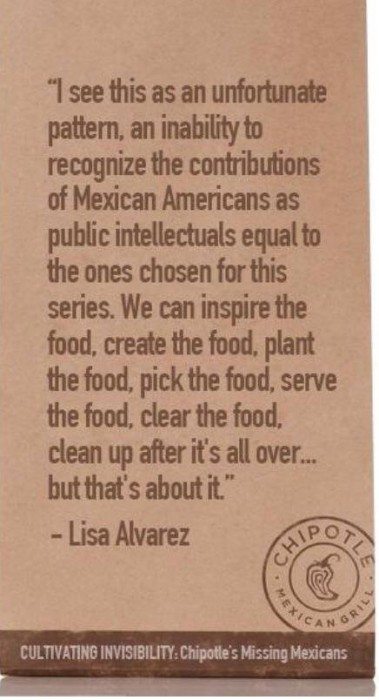We don’t need to be on a cup. That’s not the point.
The point is actually a box. A school district in Arizona can box up and physically remove from classrooms seven books in a Mexican-American studies program, and then place the rest on a watch list of literature not to be taught.
The point is the newspaper: The New York Times and publications like it can review exactly one book by a Chicana author in a given calendar year, or equally woeful numbers of authors of color, or women.
The point is the Internet: The comments section of a New Yorker article by a Pulitzer Prize-winning Dominican author (one of two Latinos in the prize’s history) can be replete with racist, classist commentary, in which he is told to erase the experiences of his friends in graduate writing programs and their assigned reading lists, devoid of writers of color. He can be told to shut up and be grateful, and he can be reminded of his good fortune with the MacArthur Foundation.
And now, we don’t have to think about Chicano writers, not one iota, when a successful writer recommends a list of authors to be included on the drink cups of a national restaurant chain making millions on imitation Mexican cuisine. Not even when said restaurant was founded in one of the centers of the Chicano movement: Denver, Colorado.
Make no mistake about it: Latino writers are not invisible. Not when there are organizations and movements dedicated to their visibility and education, to the publication of their writings, to the successful development of new writers of color across the board. But there is something fundamentally wrong with a society that is comfortable with erasing entire communities because of their languages, their surnames, their skin color, or their opinions. There is something fundamentally wrong with a dominant culture that does not question the need for these institutions in the first place.
Time after time, Latinos are asked to remain quiet while we rely on the greater angels in our government for immigration reform, or action on poverty, or the end of destructive gentrification in our neighborhoods. And time and again, our families are separated, income disparity widens, and rents spiral out of control. And our people stream out from the places where they have been forcibly removed. The resultant ills arising from these outrages hardly register a blip on the evening news.
Time and again, when our literature is banned, our culture watered-down and used to sell sandwiches or music, and our skin whitened on national magazines and in telenovelas, we are told to lower our expectations, to be grateful we receive the exposure we receive, to understand how slow change is. This is never the time to ask the larger culture to think of us when they make their lists, to complicate the stories of American literature. It’s never the time. We are never correct. We are never grateful enough.
We must consider others and strategize before we take action.
We don’t have time for punditry. More than words on a cup, in the paper, on your reading lists and year- end surveys on children’s literature, we need for the American story to be complete. We need some actual post-racialism, some practice, some right now, not another theory to deconstruct, or a bullhorn to yell into. That’s going to require some of you Anglos to get on board the learning train. I’m not asking you to listen. I’m telling you, you’re going to learn today.
You’re going to learn in Texas, where Mexican-American studies is on the curriculum—by force, maybe, but it’s there. You’re going to learn in Williamsburg, where the Domino sugar plant that employed Puerto Ricans is going to be replaced with affordable housing. You’ve already learned in Chicago, where we knocked down three separate condos to save the famous mural of Don Pedro Albizu Campos.
And Chipotle, and its literary advisor, is going to learn about the Chicano writers in Denver. (Maybe some Latinos elsewhere, too.) They can put us on every cup in the United States if they want. But they won’t have to. We’ll be in your ears soon enough.
***
Rich Villar (@elprofe316) is a poet and essayist originally from Paterson, New Jersey. His debut poetry collection, Comprehending Forever, was released in February. He directs Acentos, a grassroots project fostering the Latino/a voice in U.S. letters. He blogs at Literatiboricua.




10.2 million jobless American Workers ~ trying to provide, Food, Clothing, Shelter, & Education for their American children.
INSTEAD ~
Chiopotle hires 11.7 million illegals, unlawfully in the USA, unscreened for third-world TB to prep & serve food in their restaurants in Federal Felony violation of U.S.C, 8, Section 1324a(A) – “Unlawful Employment of Illegal Aliem”
LGBTQ owned / operated Chipotle = Anti-American
To add: In the fight against invisibility, we do have our allies:
Capicu Culture in Brooklyn:
http://www.facebook.com/capicupoetry
http://www.sofritoforyoursoul.com/lasopa/
Librotraficante
http://www.librotraficante.com
The Acentos Review
http://www.acentosreview.com
CantoMundo
http://www.cantomundo.org
VIDA: Women in Literary Arts
http://www.vidaweb.org
Roxane Gay, writer and literary activist
http://www.roxanegay.com
Voices at VONA
http://www.voicesatvona.org
El Puente, community center for human rights in Williamsburg, Brooklyn
http://www.elpuente.us
[…] well documented and acknowledged that there is a representation problem in film and TV (and on Chipotle cups too), but it’s just as bad in literary journals, publishing, and MFA programs throughout the […]
I really liked your article , your article is very petrified me in the learning process and provide additional knowledge to me , maybe I can learn more from you , I will wait for your next article article , thanks
http://yakuza4d.com/peraturan
http://yakuza4d.com
http://yakuza4d.com/home
http://yakuza4d.com/daftar
http://yakuza4d.com/cara_main
http://yakuza4d.com/hasil
http://yakuza4d.com/buku_mimpi
http://beritamedannews.blogspot.com
http://www.cintaberita.com
http://yakuza4d2.com
http://yakuza4d2.com/promo
http://yakuza4d2.com/daftar
http://yakuza4d2.com/cara_main
http://yakuza4d2.com/hasil
http://yakuza4d2.com/buku_mimpi